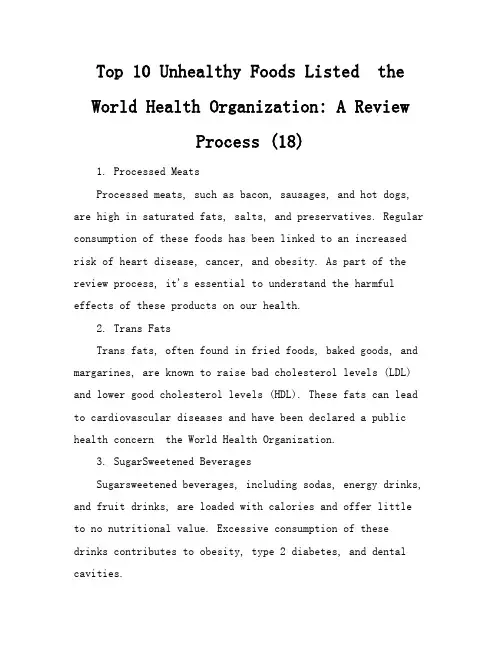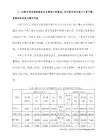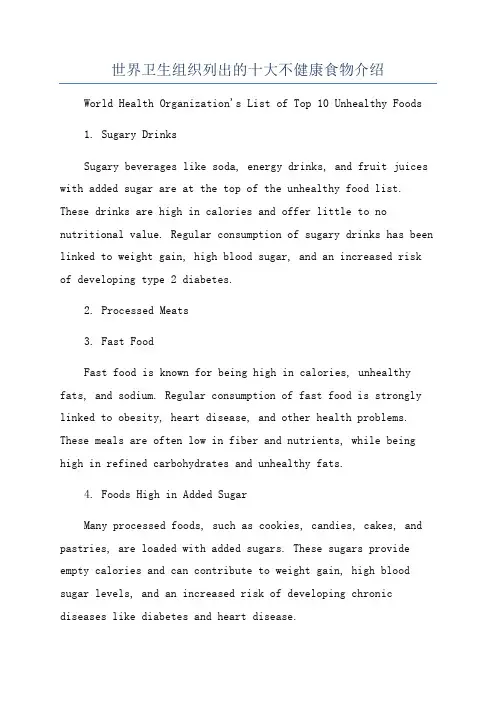世界卫生组织列出的十大不健康食物介绍(英文).ppt
- 格式:ppt
- 大小:3.18 MB
- 文档页数:8

Top 10 Unhealthy Foods Listed the World Health Organization: A ReviewProcess (18)1. Processed MeatsProcessed meats, such as bacon, sausages, and hot dogs, are high in saturated fats, salts, and preservatives. Regular consumption of these foods has been linked to an increased risk of heart disease, cancer, and obesity. As part of the review process, it's essential to understand the harmful effects of these products on our health.2. Trans FatsTrans fats, often found in fried foods, baked goods, and margarines, are known to raise bad cholesterol levels (LDL) and lower good cholesterol levels (HDL). These fats can lead to cardiovascular diseases and have been declared a public health concern the World Health Organization.3. SugarSweetened BeveragesSugarsweetened beverages, including sodas, energy drinks, and fruit drinks, are loaded with calories and offer little to no nutritional value. Excessive consumption of these drinks contributes to obesity, type 2 diabetes, and dental cavities.4. Refined GrainsRefined grains, such as white bread, rice, and pasta, have had their bran and germ removed, which strips them of essential nutrients. These foods can cause blood sugar spikes and are linked to an increased risk of metabolic syndrome and type 2 diabetes.5. Artificially Sweetened FoodsArtificially sweetened foods and beverages may seem like a healthier alternative to sugar, but they can still contribute to weight gain and metabolic disorders. The longterm effects of these sweeteners are still under review, but it's best to consume them in moderation.6. Fast FoodFast food is typically high in calories, unhealthy fats, sugars, and salts. Regular consumption of fast food can lead to weight gain, heart disease, and other health issues. As part of the review process, it's crucial to recognize the impact of fast food on our diet.7. Alcohol8. Salted SnacksSalted snacks, such as chips and pretzels, are often high in sodium and calories, leading to high blood pressure, heart disease, and weight gain. Reducing the consumption of these snacks is an essential step in maintaining a healthy diet.9. Candy and ChocolatesCandies and chocolates are packed with sugar, calories, and unhealthy fats. While occasional indulgence is fine, regular consumption can contribute to obesity, dental cavities, and other health issues.10. Frozen DinnersFrozen dinners, while convenient, are often high in sodium, unhealthy fats, and processed ingredients. They lack the nutritional value of fresh, homemade meals and can contribute to weight gain and other health problems.As we review these top 10 unhealthy foods, it's important to make informed choices about our diet and strive for a balanced, nutritious eating pattern.Continuing our exploration of the World Health Organization's list of unhealthy foods, let's delve deeper into the implications and strategies for mitigating their impact on our health.Understanding the ConsequencesThe inclusion of these foods in our diet can have farreaching consequences beyond immediate health issues. Chronic conditions like diabetes, heart disease, and certain cancers can severely impact our quality of life and place a burden on healthcare systems globally. It's essential torecognize that the foods we choose can either be a step towards wellness or a step towards illness.Strategies for Healthy EatingTo navigate away from these unhealthy options, consider the following strategies:Plan Your Meals: Preparing meals at home allows you to control the ingredients and portion sizes, reducing the temptation to rely on processed or fast foods.Read Labels: Pay attention to the nutritional labels on packaged foods. Look out for high levels of sugar, sodium, and saturated fats.Substitute Healthier Options: Replace processed meats with lean proteins like chicken, fish, or plantbased alternatives. Opt for whole grains instead of refined grains.Mindful Eating: Be conscious of why and how much you're eating. Avoid eating out of boredom or habit.Limit Sugar: Reduce the amount of sugar in your diet choosing water or unsweetened beverages over sugary drinks and limiting desserts.Balance Your Diet: Ensure your diet includes a variety of fruits, vegetables, whole grains, and healthy fats to provide the necessary nutrients for good health.Cultivating a Healthier Food CultureThe journey towards better health doesn't end with individual choices. It's also about fostering a culture that supports and encourages healthy eating habits. This can involve:Community Initiatives: Support local programs that promote healthy eating and nutrition education.Policy Changes: Advocate for policies that limit the marketing of unhealthy foods to children and that make healthy foods more accessible and affordable.School Lunch Programs: Encourage the inclusion of nutritious meals in school lunch programs to instill good eating habits from a young age.Workplace Wellness: Implement workplace wellness programs that include nutrition education and healthy food options.In ConclusionThe foods we eat are a cornerstone of our health and wellbeing. By understanding the potential harm of the top 10 unhealthy foods and adopting strategies to avoid or minimize them, we can take significant steps towards a healthier lifestyle. Remember, every positive change, no matter how small, contributes to a larger, healthier picture.Embracing a Healthier LifestyleEmpowering Personal ChoicesEach individual has the power to make choices that can significantly impact their health. Here are some practical steps to empower personal choices:Cooking Classes: Engage in cooking classes or workshops that teach how to prepare healthy, delicious meals. Learning new culinary skills can make home cooking more enjoyable and rewarding.Mindful Shopping: When grocery shopping, stick to a list and avoid impulse buys. Focus on the perimeter of the store where fresh produce, meats, and dairy are typically found.Enjoyment of Food: Find pleasure in healthy eating experimenting with new flavors and ingredients. Enjoyment of food is key to maintaining a balanced diet.Addressing Societal ChallengesThe prevalence of unhealthy foods in our society poses significant challenges. To address these, a multifaceted approach is necessary:Food Industry Responsibility: Encourage the foodindustry to reformulate products to reduce levels of sugar, salt, and unhealthy fats. Advocate for transparent labeling to help consumers make informed choices.Economic Incentives: Support initiatives that make healthy foods more affordable and unhealthy foods less so,through subsidies for healthy produce or taxes on sugary drinks.The Path ForwardThe path to a healthier lifestyle is not a straight line; it's a journey with twists and turns. It's about progress, not perfection. Here are some final thoughts to keep in mind: Patience: Change takes time. Be patient with yourself as you transition to a healthier diet and lifestyle.Flexibility: Life is unpredictable, and it's okay to indulge occasionally. The key is balance and not letting one unhealthy choice snowball into a series of them.Gratitude: Be grateful for the food you have and the ability to make choices that support your health.By taking these steps, we can all contribute to a future where healthy eating is the norm, not the exception, and where the prevalence of dietrelated diseases is significantly reduced. Let's move forward with the understanding that the food we choose is a celebration of life, a source of energy, and a foundation for our wellbeing.。




世界卫生组织列出的十大不健康食物介绍World Health Organization's List of Top 10 Unhealthy Foods1. Sugary DrinksSugary beverages like soda, energy drinks, and fruit juices with added sugar are at the top of the unhealthy food list. These drinks are high in calories and offer little to no nutritional value. Regular consumption of sugary drinks has been linked to weight gain, high blood sugar, and an increased risk of developing type 2 diabetes.2. Processed Meats3. Fast FoodFast food is known for being high in calories, unhealthy fats, and sodium. Regular consumption of fast food is strongly linked to obesity, heart disease, and other health problems. These meals are often low in fiber and nutrients, while being high in refined carbohydrates and unhealthy fats.4. Foods High in Added SugarMany processed foods, such as cookies, candies, cakes, and pastries, are loaded with added sugars. These sugars provide empty calories and can contribute to weight gain, high blood sugar levels, and an increased risk of developing chronic diseases like diabetes and heart disease.5. Fried FoodsFoods that are deep-fried, such as French fries, fried chicken, and doughnuts, are high in calories, unhealthy fats, and trans fats. Regularly consuming fried foods can lead to weight gain, high cholesterol, and an increased risk of heart disease.6. Highly Processed Snack FoodsSnack foods like potato chips, crackers, and pretzels are often highly processed and can be detrimental to health. They are typically high in unhealthy fats, sodium, and refined carbohydrates, while being low in nutrients. Regular consumption of these foods can contribute to weight gain, high blood pressure, and other health issues.7. Artificially Sweetened Foods and DrinksArtificial sweeteners are often found in diet sodas, sugar-free candies, and other products marketed as healthy alternatives. However, many studies have shown that artificial sweeteners may have negative health effects and may be associated with weight gain, metabolic disorders, and an increased risk of chronic diseases.8. Trans Fats9. Processed CheeseProcessed cheese products, such as cheese spreads and spray cheeses, are high in unhealthy fats, sodium, and additives. These products often lack the nutritional benefits of natural cheese and can contribute to weight gain, high blood pressure, and heart disease.10. Canned Foods with Added SodiumCanned foods, such as soups, vegetables, and beans, often contain high amounts of added sodium as a preservative. Excessive sodium intake has been linked to high blood pressure, heart disease, and stroke. WHO advises choosing low-sodium orno-added-salt versions of canned foods whenever possible.It is important to note that while these foods have been identified as unhealthy, moderation is key. Occasional indulgence in these foods may not have significant negative effects on overall health, but regular consumption can lead to serious health problems. Prioritizing a balanced diet consisting of whole, unprocessed foods is crucial for maintaining good health and preventing chronic diseases.。

